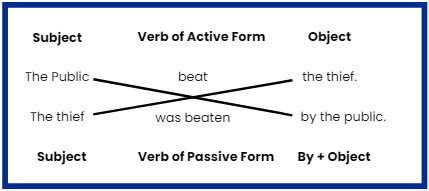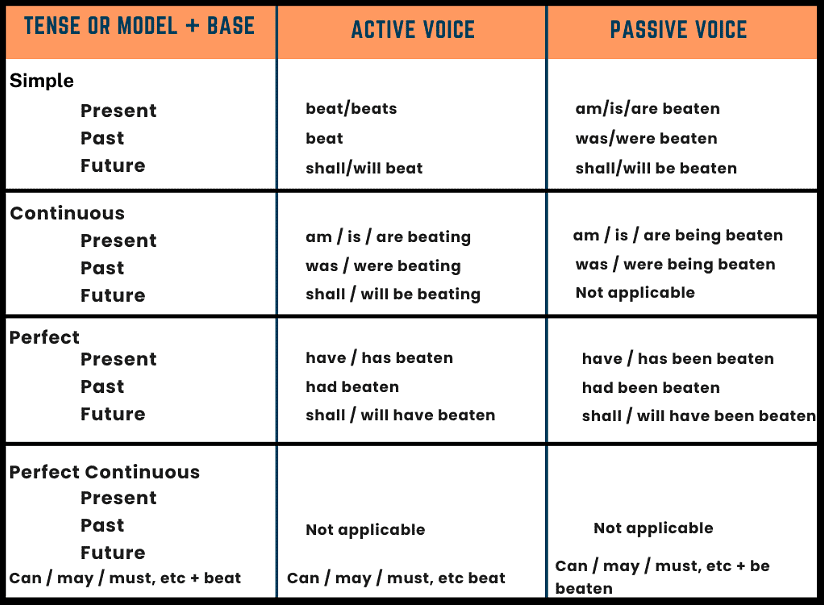Voice | English Grammar Basic - Class 10 PDF Download
| Table of contents |

|
| Understanding Voice |

|
| Subject, Verb and Object |

|
| Types of Voice |

|
| Change of Voice |

|
| Transformation of Active Voice Into Passive Voice |

|
Understanding Voice
Voice is that form of a Verb which shows whether what is denoted by the subject does something or has something done to it. Or the voice of a verb tells whether the subject of the sentence performs or receives the action.
Subject, Verb and Object
To grasp the concept of voice, we need to understand three basic terms:
- Subject: The doer of the action.
- Verb: The action performed by the subject.
- Object: The receiver of the action performed by the subject.
Now, let's explore the different types of voice in detail.
Types of Voice
- Active Voice: In active voice, the subject is the doer of the action. The focus is on the subject performing the action.
- Passive Voice: In passive voice, the subject is the receiver of the action. The focus is on what is being done to the subject.
Understanding the Types of Voices
Now, examine the following sentences carefully.
- Raghav sold his old car. (Active voice)
- His old car was sold by Raghav. (Passive voice)
Q. What is the action being performed in both sentences?
Selling = Verb
Q. Who is selling?
Raghav = Subject
Q. What is being sold?
Old car = Object
- No matter whether the sentence begins with ‘Raghav’ or ‘His old car’, the performer of the action of selling is ‘Raghav’. Therefore ‘Raghav’ is the subject.
- And the sentence beginning with the subject ‘Raghav’ i.e. Raghav sold his old car, is in active voice whereas the sentence beginning with ‘His old car’, the receiver of the action (object) i.e. His old car was sold by Raghav is in passive voice.
- So, now, it is crystal clear that if you understand who the performer of the action is, it becomes very easy to decide whether the sentence you want to form will follow the syntax of Active or Passive voice.
Active Voice: A verb is said to be in the Active Voice when the person or thing denoted by the subject is the doer of the action (when the subject acts or is active ).
Passive Voice: A verb is said to be in the Passive Voice when the person or thing denoted by the subject is the receiver of the action (when the subject is passive/acted upon).
Change of Voice
While changing a verb from Active voice to Passive voice, the following general rules should be followed:
- The object of the active verb is made the subject of ‘ the passive verb.
- The subject of the active verb is made the object of the passive verb. This object is preceded by a preposition mostly ‘by’; in some cases, ‘to’ or ‘with’. It will be elucidated further in the chapter.
- The passive voice must contain the third form of the main or finite verb.
- Helping verb is placed before the main verb.
- The tense of the verb does not change.
- The form of the verb is changed according to the tense.

Change of Persons
Change of Verb according to Tense

Transformation of Active Voice Into Passive Voice
1. Present Tense
(a) Simple Present Tense
Active : S + V1 (first form of verb) + O
Passive : ‘O’ + am/is/are + V3 (third form of verb) + by + ‘S’
Examples:
- I bake a cake today. (Active voice)
A cake is baked by me today. (Passive voice) - NDTV launches gadgets360.com soon. (Active voice)
Gadgets360.com is launched soon by NDTV. (Passive voice) - The jury will declare the results in a few minutes. (Active voice)
The results will be declared in a few minutes by the jury. (Passive voice) - Anushka and Neha learn Salsa. (Active voice)
Salsa is learnt by Anushka and Neha. (Passive voice) - The archaeologists study the fossils. (Active voice)
The fossils are studied by the archaeologists. (Passive voice)
(b) Present Continuous Tense
Active : S + am/is/are + V1 + ing + O
Passive : O + am/is/are + being + V3 + by + S
Examples:
- Rishabh is painting the portrait of a lady. (Active voice)
The portrait of a lady is being painted by Rishabh. (Passive voice) - The police are investigating the matter. (Active voice)
The matter is being investigated by the police. (Passive voice) - She is preparing the list of guests for the party. (Active voice)
The list of guests for the party is being prepared by her. (Passive voice) - Indian scientists are developing the technology against data hacking. (Active voice)
The technology against data hacking is being developed by Indian scientists. (Passive voice) - The secretary of the manager is preparing the agenda of the meeting. (Active voice)
The agenda of the meeting is being prepared by the secretary of the manager. (Passive voice)
(c) Present Perfect Tense
Active : S + has/have + V3 + O
Passive : O + has/have + been + V3 + by + S
Examples:
- Ovi has changed the channel on TV. (Active voice)
The channel on TV has been changed by Ovi. (Passive voice) - Anurag Basu has made a few very good movies. (Active voice)
A few very good movies have been made by Anurag Basu. (Passive voice) - They have auctioned ‘Shabnam Villa’. (Active voice)
‘Shabnam Villa’ has been auctioned by them. (Passive voice) - Nitika and Vihaan have revealed their secrets. (Active voice)
Their secrets have been revealed by Nitika and Vihaan. (Passive voice) - This book has incorporated all the important topics. (Active voice)
All the important topics have been incorporated by this book. (Passive voice)
2. Past Tense
(a) Simple Past Tense
Active : S + V2 + O
Passive : O + was/were + V3 + by + S
Examples:
- We submitted the assignments last week. (Active voice)
The assignments were submitted last week by us. (Passive voice) - Sakshi cracked GRE at the very first attempt. (Active voice)
GRE was cracked at the very first attempt by Sakshi. (Passive voice) - India won last Hockey World Cup many years back. (Active voice)
Last Hockey World Cup was won many years back by India. (Passive voice) - Vansh grabbed four prizes at the Inter School competitions. (Active voice)
Four prizes were grabbed by Vansh at the Inter-school competition. (Passive voice) - My father purchased this car in the year 1997. (Active voice)
This car was purchased in the year 1997 by my father. (Passive voice)
(b) Past Continuous Tense
Active: S + was/were + V1 + ing + O
Passive: O + was/were + being + V3 + by + S
Examples:
- He was practising Hinduism. (Active voice)
Hinduism was being practised by him. (Passive voice) - Sumi was counting stars in the sky. (Active voice)
Stars in the sky were being counted by Sumi. (Passive voice) - They were flying kites. (Active voice)
Kites were being flown by them. (Passive voice) - Sejal and Mahima were planting trees in the garden. (Active voice)
Trees were being planted in the garden by Sejal and Mahima. (Passive voice) - Radha was searching something in the cupboard. (Active voice)
Something was being searched in the cupboard by Radha. (Passive voice)
(c) Past Perfect Tense
Active: S + had + V3 + O
Passive: O + had been + V3 + by + S
Examples:
- I had already done this. (Active voice)
This had been already / had already been done by me. (Passive voice) - He had tolerated much before coming to this city. (Active voice)
Much had been tolerated by him before coming to this city. (Passive voice) - Sahil had sent the invitation letter. (Active voice)
The invitation letter had been sent by Sahil. (Passive voice) - Noorjahan had learnt many recipes of Chinese food. (Active voice)
Many recipes of Chinese food had been learnt by Noorjahan. (Passive voice) - Rudra had not accepted the offer. (Active voice)
The offer had not been accepted by Rudra. (Passive voice)
3. Future Tense
(a) Simple Future Tense
Active: S + shall/will + V1 + O
Passive: O + shall/will + be + V3 + by + S
Examples:
- He will manipulate her. (Active voice)
She will be manipulated by him. (Passive voice) - We will find out a solution. (Active voice)
A solution will be found out by us. (Passive voice) - Trespassers shall not use this road. (Active voice)
This road shall not be used by trespassers. (Passive voice) - God will endow him with the power of speech one day. (Active voice)
He will be endowed with the power of speech by God one day. (Passive voice) - The boss will not entertain his lame excuses. (Active voice)
His lame excuses will not be entertained by the boss. (Passive voice)
(b) Future Perfect Tense
Active: S + shall/will have + V3 + O
Passive: O + shall/will have + been + V3 + by + S
Examples:
- Mother will have prepared delicious lunch. (Active voice)
Delicious lunch will have been prepared by mother. (Passive voice) - You will have won the game. (Active voice)
The game will have been won by you. (Passive voice) - India will have eradicated illiteracy by 2020. (Active voice)
Illiteracy will have been eradicated by 2020 by India. (Passive voice) - Shanu will have eaten up all the chocolates. (Active voice)
All the chocolates will have been eaten up by Shanu. (Passive voice) - Miheer will have surprised her. (Active voice)
She will have been surprised by Miheer. (Passive voice)
|
20 videos|143 docs|18 tests
|
FAQs on Voice - English Grammar Basic - Class 10
| 1. What is the subject, verb, and object in a sentence? |  |
| 2. What are the different types of voice in grammar? |  |
| 3. How do you change a sentence from active voice to passive voice? |  |
| 4. Can you give an example of transforming a sentence from active voice to passive voice? |  |
| 5. What is the importance of using active and passive voice in writing? |  |





















